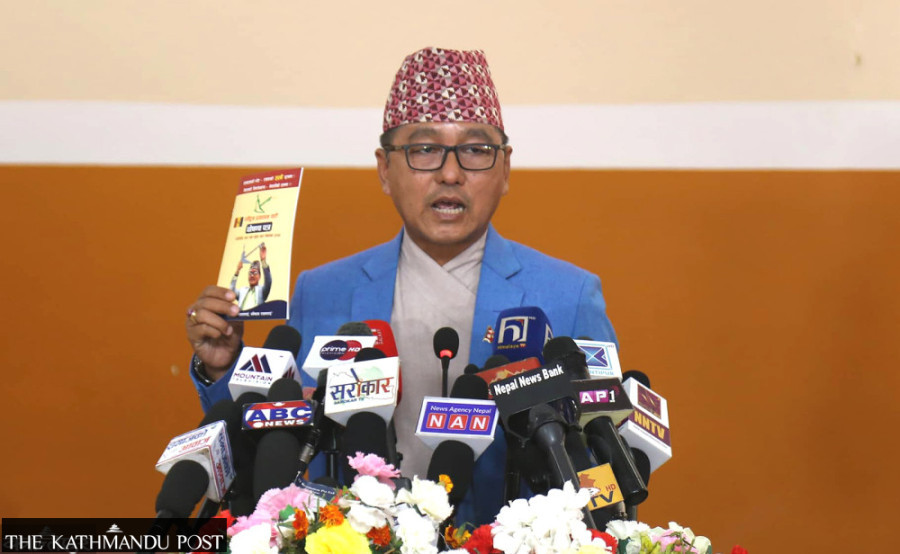Politics
Rastriya Prajatantra Party announces nationwide protest
The right-wing party aims to consolidate forces rallying against the current dispensation.
Post Report
Amid the homework of the ruling parties to bring Rastriya Prajatantra Party on board the federal cabinet and in Koshi Province, the right-wing outfit has announced nationwide protests to reinstate Nepal as a Hindu kingdom and scrap provincial structures.
A three-day central committee meeting of the fifth largest party in the federal parliament announced on Tuesday that it would start the ‘Mechi-Mahakali unity march’ and Kathmandu-centric demonstrations for a month from mid-February.
The party said it will hold warm-up meetings and consultations with like-minded forces and individuals in December and January to increase its support base.
“The present government has failed to deliver. Pessimism among the public is at its height,” said party’s chair Rajendra Lingden while announcing the protest programme on Tuesday. “This is also the failure of the present governance system.”
The party, formed by politicians close to the palace, has embraced anti-federalism, anti-secularism and anti-republicanism as its guiding principle. The party contested the 2017 general elections, the first since the country adopted the new constitution, with these agendas and won 14 seats in the 275-strong House of Representatives. It also contested the provincial and local polls and registered victory in different constituencies. The party holds the Speaker’s position in Bagmati Provincial Assembly.
Lingden said that if necessary, the party was ready to resign not just from provincial assemblies but also from the House. The party for months had been brainstorming about its future moves. While the party’s faction led by Lingden was not fully convinced to launch a protest immediately, another faction led by General Secretary Dhawal Sumsher Rana had strongly advocated protests. The RPP has formed a Lingden-led main committee and Rana-led mobilisation panel for the protest.
In the three-day meeting, leaders representing different provinces had argued that the country-wide mobilisation was necessary to generate optimism that there was an alternative force. There were also strong calls for the party to play a role in consolidating various organisations that have been raising issues of reinstatement of monarchy and Hindu state, and scrapping federalism.
Of late, controversial businessman Durga Prasai has been staging mass gatherings in different parts of the country including in Kathmandu, championing a cause similar to that of the RPP. “It is good that different forces are raising the agendas that our party has long been carrying,” Sagun Sundar Lawati, the party’s central committee member, told the Post. “Our party will collaborate with Prasai or other forces for a common cause.”
Insiders say the party has unanimously agreed that it should not be joining either the provincial or federal governments, both of which, they say, have completely failed.
“The ruling parties wanted the RPP to join the Koshi provincial government and were open to creating space in the federal government as well,” Mohan Shrestha, the party’s publicity department chief, told the Post. “But the chapter of joining the government has ended now. We will use the street and Parliament to raise our demands.”
The Nepali Congress-led ruling alliance has been reaching out to the RPP for a stable government in Koshi. The Congress aims to win the RPP’s support to its government to ensure it continues to command a full majority in case the CPN-UML withdraws its support. But the party has ended that possibility, forcing the ruling alliance to search for other alternatives.
The alliance can offer the Speaker’s position in exchange for the support of the government. The UML is demanding the position, too.
Currently, the UML holds the deputy Speaker’s position. It has to give up the position as per the constitution to claim the Speaker’s post. Article 182 (2) of the statute says there should be one woman out of the provincial Speaker and the deputy Speaker, and the two must be from different parties.
With 40 seats, the UML is the largest party in the assembly. Congress has 29 seats, the CPN (Maoist Centre) 12, the RPP six, the Unified Socialist four, and the Janata Samajbadi Party has one seat.
Kedar Karki was appointed chief minister as per Article 168(5) of the constitution, under which a provincial assembly member can claim the chief ministerial position by producing the support of the majority members. This is the last option for the formation of government.
The ruling alliance has 47 seats in the 93-strong provincial assembly. However, it will not be possible to prove the number in the floor test given the deputy Speaker abstains from the voting process and the senior most member from the alliance needs to chair the assembly. The previous Uddhav Thapa government fell due to the same reason. Karki doesn’t want to repeat the mistake. Despite quitting the government, the UML hasn’t withdrawn its support to the Karki government.
Shrestha said as the Speaker's position is not the government portfolio, the RPP can consider accepting it. “However, we haven’t yet decided whether to accept the offer in exchange of support to the government,” he said.




 8.79°C Kathmandu
8.79°C Kathmandu













